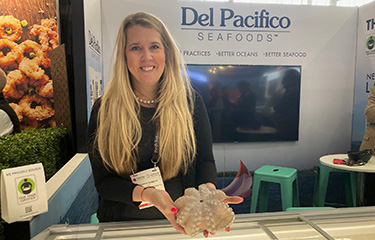Del Pacifico Seafoods’ newest product, its Mayan Octopus, is caught off the coast of Yucatan, Mexico using small dayboats that fit just one or two fishermen, who use the wind and tide to drift-fish and attract the species with a crab lure on a bamboo pole.
It’s certainly not the most efficient means of catching octopus, according to Del Pacifico Chief Commercial Officer Jennifer Barrett. But the company’s support of the fishery is guided by a philosophy of support for the “human element of fishing,” Barrett told SeafoodSource at the 2023 Seafood Expo North America.
“We're keeping the respect for the livelihood of the fishery. It's truly artisanal, and we try at all times to give back to the local fishing communities in Mexico to give them a voice and make sure that that they have everything that they need to operate,” Barrett said.
Del Pacifico’s Mayan Octopus carries Fair Trade certification, which ensures standards for safe working conditions, environmental protection, and sustainable livelihoods. In accordance with the certification, the fishery lasts only from August to December, shutting down for the rest of the year to ensure the species can reproduce. And its fishing method ensures zero bycatch, according to Barrett, and a percentage of each sale is returned to the local communities where the octopus is caught.
“We’re going in a different direction than what the seafood industry is doing. Most of the octopus sold worldwide is brought in from Spain, which typically, we don't really know what its origins are – it could be from Morocco, Yemen, Senegal, or sometimes Mexico,” Barrett said. “Country of origin is an issue with octopus globally. The demand is so big in Japan and Asia that a lot of that is going to end up there. But we think in the U.S. market, there’s a greater demand for traceability and country of origin concerns."
The Mayan octopus is a species unique to the Yucatan area of Mexico, according to Barrett. In its first year, Del Pacifico plans to make around 40 metric tons of it available to foodservice outlets, in both block frozen or flowered flash-frozen formats. It is sold chemical-free, preservative-free, and is 100 percent traceable, she said.
It will never be a mass-market product, Barrett said, acknowledging her frustrations upon a visit to the fishery in the Yucatan and seeing local fishermen competing against larger, industrial vessels and scuba divers who fish year-round, contrary to best practices for octopus fishing.
“It’s such a balance of how are we going to solve the problems facing the seafood industry, but also take care of the people who depend on it for their livelihoods? How are we going to limit our fishing while keeping prices affordable? How do we avoid depleting our own fishery in Mexico, which Morocco's learned the hard way happens if you don’t do things right?” Barrett said. “It’s our belief if you’re not sustaining the communities behind the fishery, and if you're not taking care of the environment around it, it's not sustainable.”
A year ago, the Downey, California, U.S.A.-based company launched a line of responsibly-farmed shrimp and oysters at the 2022 Seafood Expo North America. It also offers Fair Trade-certified wild-caught shrimp caught off the coast of Sinaloa, Mexico. Barrett said Del Pacifico is investigating an expansion into the European market for both its shrimp and octopus, and is continuing to find new buyers, such as Whole Foods, for its value-added products, including cooked shrimp, and its shrimp burgers.
It operates two farms producing ...
Photo courtesy of Cliff White/SeafoodSource








